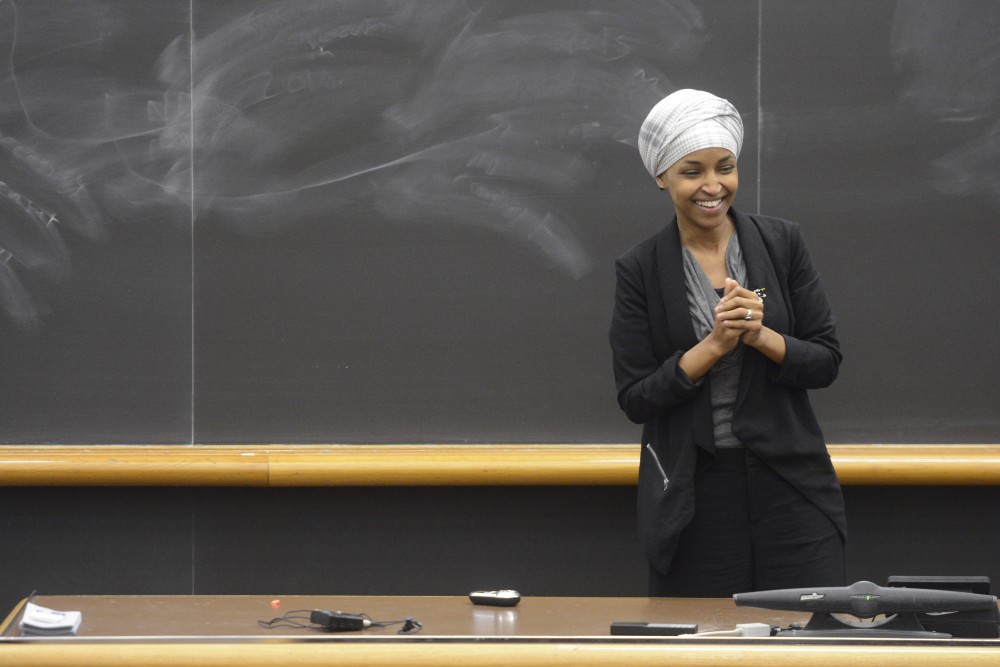Democratic State Rep. Ilhan Omar doesn’t see her freshman status in the Republican-controlled Legislature as an obstacle.
Omar introduced 23 bills in her first few months at the Capitol, five of which are included in omnibus bills. While many of her bills haven’t received hearings, Omar — the first Somali-American elected to a state legislature — has found common ground with lawmakers of both parties.
“We are in a minority, but we don’t have to look at that as a negative thing,” Omar said.
Republican and DFL House colleagues say Omar quickly found her place in the Legislature, but her first session hasn’t come without challenges. Amid a daily schedule packed with committee and constituent meetings, Omar has shouldered added responsibility dealing with fallout from President Donald Trump’s travel bans.
Omar starts each day at the Capitol around 7:30 a.m., spending most of her morning hours in committee meetings. Some nights, she doesn’t get home until 9 p.m. “I feel bad that I keep promising my kids that the work will get less, and then it gets more,” Omar said.
She sits on three House committees — higher education policy and finance, state government finance and civil law and data practices.
Rep. Bud Nornes, R-Fergus Falls, chair of the higher education committee, said Omar’s pleasant personality has suited her well as a freshman member of the committee.
“That’s not always the case with elected officials,” Nornes said. “Sometimes … the election certificate goes to the head a little bit.”
Three of her bills were included in the House’s higher education omnibus bill —expansion of childcare grants for student-parents, funding for a summer enrichment program and a requirement that higher education institutions give bills of rights to student-parents and pregnant students.
“That’s good as a freshman when she’s in a minority,” said Rep. Jennifer Schultz, DFL-Duluth, fellow higher education committee member.
Omar’s legislative mentor, Rep. Jim Davnie, DFL-Minneapolis, said her “steel spine” and calm demeanor have added to her success.
“You’re not going to push her around, but she’s going to greet you respectfully and warmly and share her perspective,” he said.
Minnesota Student Association Government and Legislative Affairs Director Will Dammann said Omar’s ability to connect with those from both parties might help her gain more bipartisan support for future bills.
It’s usually hard to push bills forward from the minority, he said.
“You basically … have to sit back and you’re on the defense most of the time,” Dammann said.

Managing constituent needs
On Monday evening, Omar rushed from a Capitol committee meeting to a speaking engagement at the University of Minnesota — her second for students in the last week.
At the sold-out event, “An evening with Rep. Ilhan Omar,” she fielded questions from students on topics from her legislative work and political organizing to her experiences with gender stereotypes.
Since Omar took office, she’s been receptive to student needs and concerns, Dammann said.
MSA works closely with Omar on legislative affairs, he said, and her connection to the higher education committee has been an asset.
When not at the Capitol, Omar holds Friday office hours at her in-district office in Cedar-Riverside.
Omar chose the in-district office to be more accessible to students and East African elders.
“My need for a representative that I can have access to is what I try to fulfill for the people that I represent,” Omar said.
Omar has helped reconnect East African community members to the Capitol by holding regular listening sessions, said Mohamud Noor, the executive director of the Confederation of Somali Community in Minnesota who is also a former opponent of Omar’s.
“We can door-knock on her home and just talk to her, so that’s the point of accessibility we have,” Noor said.
Amano Dube, director of the Brian Coyle Center, said Omar has also held community forums at local mosques and organizations. Additionally, she has introduced bills aimed to fund community projects, including funding for the Cedar-Riverside Opportunity Center and expansion of the Somali Museum.
But Dube said he is interested to see whether Omar can maintain this level of engagement moving forward.
“What I would advise her … is making sure no one is left out,” he said.

Quelling community fears
After she was sworn in on Jan. 3, Omar expected the first month of her legislative career to go smoothly.
But when President Donald Trump signed an executive order that prohibited travel from seven Muslim-majority countries — including Somalia — Omar faced a community in disarray.
Community members turned to Omar for advice and support.
“It felt at the beginning as if everybody forgot about everyone else in the community that they can turn to,” she said.
The national attention Omar gained since her election manifested at this time — as she received calls from concerned Somalis nationwide.
Omar quickly condemned the travel ban and led a rally attended by more than 1,000 at the Brian Coyle Center two days later.
Dealing with fallout from the executive orders has been her greatest challenge as a first-year lawmaker, Omar said.
“I am alone in being a freshman who is now expected to also be an ambassador and a defender of a whole group of people,” she said.
Rep. Jim Davnie said the challenge of representing a whole community is not unique to Omar.
Many legislators of color are asked to represent their whole race, he said, rather than just their constituents. This can be a difficult burden for a freshman lawmaker.
“[Being the first Somali-American state legislator] I think is both an asset and a challenge in the politics of this institution,” he said.








